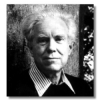Elliott Carter

Elliott Carter
Elliott Cook Carter, Jr.was an American composer who was twice awarded the Pulitzer Prize. He studied with Nadia Boulanger in Paris in the 1930s, then returned to the United States. After an early neoclassical phase, his style shifted to an emphasis on atonality and rhythmic complexity. His compositions are known and performed throughout the world; they include orchestral, chamber music, solo instrumental, and vocal works...
NationalityAmerican
ProfessionComposer
Date of Birth11 December 1908
CountryUnited States of America